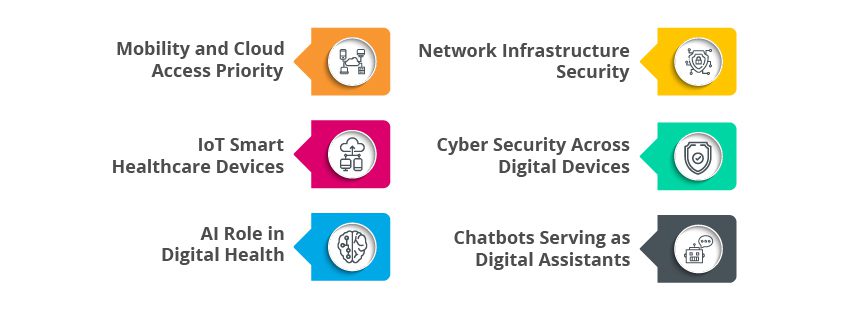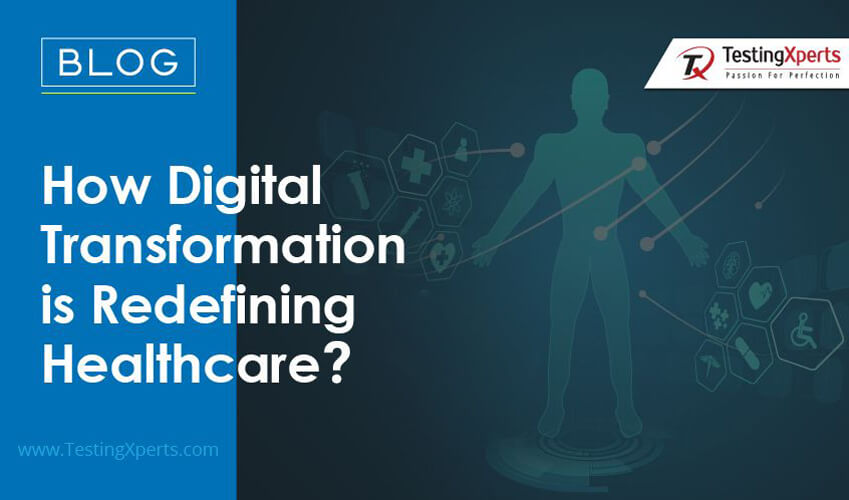Table of Content
- What is Digital Transformation in Healthcare?
- What are Benefits of Digital Transformation in Healthcare?
- Which Emerging Trends in Digital Healthcare Need Testing Solutions?
- What are the challenges faced with healthcare digitalization?
- Conclusion
What is Digital Transformation in Healthcare?
Digital health is broadly defined as the convergence of digital technologies into all areas of healthcare to fundamentally change the way systems operate, function and deliver good healthcare to patients. There is a disruption in the old, long-standing healthcare processes that have been changed with the new digital initiatives. In a way, digitalization is achieved by embedding technology in healthcare that ensures effective patient care delivered at low costs.
Forbes in their article on Healthcare Growth Drivers 2020 states that the digital transformation of healthcare will gain momentum. The drivers include better tools such as AI (Artificial Intelligence) and virtual trials to empower patient outcomes, maturation of funding to public markets, regulatory innovation, technology adoption and more alliances between entrepreneurs and large companies.
With digitalization on the rise, these health-care systems have become safer, more affordable, and more accessible to patients. Moreover, it has made healthcare companies to rethink business processes and make it more patient-centric and affordable. Therefore, using digital technologies in healthcare places the patient is at the center of the eco-system and ensures to deliver better healthcare outcomes.
Significantly, an effective digital transformation in healthcare requires at first place a cultural change. This facet encompasses implementing new business models, along with evolving new and different ways of thinking within the healthcare enterprises. It perhaps also demands effective management and communication delivered to patients, and handling of various compliances and regulations while ensuring to be digital. Primarily, digital health ensures and drives effective patient engagement and better healthcare outcomes.
What are Benefits of Digital Transformation in Healthcare?
Digital transformation in healthcare redefines how people, technology and devices interact and connect seamlessly further:
– It helps to promote better patient care
– Reduces overall healthcare costs
– Improves patient outcomes
– Enables a superior healing experience for patients
– Helps clinical and administrative staff to deliver safer, timely, and higher quality care
– Supports new care approaches and solutions to make healthcare delivery less expensive and more efficient
– It makes healthcare accessible to all and enables enhanced healthcare pathways
Although digital health has tremendous potential to improve quality and reduce costs in healthcare, there are five major areas of digital healthcare that need effective testing solutions to fully realize its potential.
Therefore, it is essential to bring together the emerging trends of network infrastructure security, mobility and cloud access, IoT smart devices and usage of AI in healthcare, to be properly aligned to ensure the success of digital healthcare.
Which Emerging Trends in Digital Healthcare Need Testing Solutions?

1. Mobility and Cloud Access Priority:
Today, undoubtedly the game-changer is an expansion of mobile apps access to data that is maintained on the cloud, ensuring quick and easy access. This sort of continuous access through mobile apps eases patient care and clinicians also get to know the clinical reports and patient data instantly. With electronic medical records (EMR) in the cloud, patients and doctors can access medical data 24/7.
Moreover, in hospitals, the concept of mobile-first has been on demand. These mobile apps should be tested thoroughly by embracing mobile application testing as patient data is critical and only accurate data stands valid.
Any error in medical record data would cost the healthcare providers largely and hence, end-to-end mobile application testing has to be taken up by manufacturers.
2. IoT Smart Healthcare Devices:
There has been an increased usage of IoT connected devices that prove to improve outcomes and patient engagements. Specifically, these IoT systems range from connected medical devices such as MRI, CT scanners, wearable devices, remote patient monitors, video conferencing digital devices, telemedicine devices, and security cameras.
These connected devices have made digital health accessible even in remote areas. These connected healthcare devices ensure better patient care and deliver better patient outcomes but evidently, medical devices and software should be tested thoroughly to ensure effective results.
3. AI Role in Digital Health:
Forbes states that Artificial Intelligence (AI) in healthcare is a giant opportunity to help revolutionize patient outcomes and reduce costs. AI is a powerful way to redefine data and its predictions by using algorithms. It provides a profound understanding of critical diseases such as cancer, genetic diseases, and others, thus paving the way for enabling better treatment to patients with quick identification of disease stage.
It has also been observed that various pharmaceutical and other healthcare companies are deploying machine learning algorithms for exploring chemical and biological interactions to develop new drugs and get predictions replacing the age-old process of conducting only clinical trials.
4. Network Infrastructure Security:
The network infrastructure of healthcare organizations is the foundation of digital transformation, as robust, secure and resilient connectivity is vital. This infrastructure component optimizes the pathway across the healthcare ecosystem. Therefore, it is evident that a secure network lays the ground for delivering secure data, applications, mobility and IoT connectivity that ultimately drives outstanding patient care and improves healthcare outcomes. Thus, in order to ensure network security across the digital platform, it is essential to leverage security testing to avoid threats and vulnerabilities.
5. Cyber Security Across Digital Devices:
Hacking and cyber-attacks are common today in the data networks which has become a major concern for healthcare organizations. The massive Wannacry cyberattack infiltrated hospital networks across Europe and North America and posed a halt to their medical services.
Healthcare IoT systems are more vulnerable to hacking and threats as the proliferation of sensors and connected devices greatly expand and ease network attacks. Many healthcare IoT devices are manufactured without following security measures and continue to be more susceptible.
Hence, these connected systems and devices are becoming susceptible to attacks affecting hospitals, and clinics. Further, the manufacturers should leverage security testing services to ensure effective devices are set in place.
6. Chatbots Serving as Digital Assistants:
The digital assistants also commonly named Chatbots are a subset derived using AI, ML and NLP technologies. A digital assistant can speak different languages and becomes handy through its support for voice and text messages. These chatbots effectively store and process the data as self-learners. They provide a personalized experience to patients and some of them even provide emotional support to patients.
Particularly, these assistants can be used to answer frequently asked questions FAQ, suggest products, take orders, handle payments and organize meetings and notifications on a need-based across the digital healthcare domain. Chatbots should be tested with real-time scenarios to enable the best outcomes while embedding them in healthcare channels.
What are the challenges faced with healthcare digitalization?
Challenges with Respect to Incurring Costs:
Healthcare organizations aim to drive more revenue from the small investments they do and this could be an essential factor that hinders them from moving towards digitalization. But, incurring costs is essential for today’s enterprises as without digitalization businesses cannot survive in today’s competitive healthcare world.
Challenges with new change adoptions:
Another reason why many of the healthcare businesses place a back step is due to the fear and concern to accept any new change. Legacy systems or remaining on the same platform may not be a good sign for them as new technologies are trending and need to be adopted to stay aligned in the industry and be ahead of competitors by adopting new changes aligned with digitalization.
Challenge to maintain effective data aggregation:
In healthcare industries, the amount of data generated in a day is massive. Yet, the challenge is how the data is managed. With the siloed data across the industry, it becomes inefficient for the industries to perform the required data segregation and interoperability. And, this largely affects the customer experience and might affect their brand. Thus, it becomes essential to integrate the data from all systems and ensure proper collaboration to ensure proper data access and usage.
Challenge to maintain secured data:
The ever-changing digitalizing technology within the healthcare industry is providing many ways to increase productivity and at the same time it is experiencing security issues with cyber-attacks. When considering the medical sector, every electronic medical record maintained by the enterprise maintains the personal and sensitive data of the user. If the growing number of cyber-breaches continues to occur, it probably affects the user’s trust and the company’s brand. Hence, to ensure a secure environment that can overcome the cyber-breaches, healthcare businesses need to adopt security testing services from a next-gen testing service provider.
Conclusion
By taking a comprehensive approach to digitization, healthcare organizations can deliver services more quickly, and deliver better patient care with low costs. The major facets of the digital healthcare domain are revolving around network security, IoT smart devices, usage of AI and chatbots in the healthcare channels.
Undoubtedly, digital technology in the healthcare industry is fast proving to be a game-changer and in order to get the complete benefits out of the system, end-to-end software testing services should be taken up by next-gen testing service providers.


